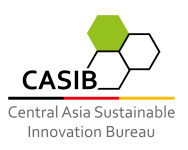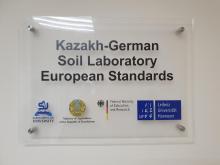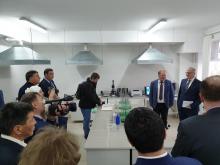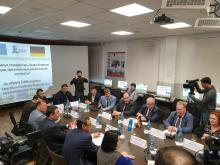On October 25, a new pedologic laboratory at S. Seifullin Kazakh AgroTechnical University (KazATU) in Nur-Sultan was formally taken into operation in Nur-Sultan. The establishment of this laboratory, equipped to international standards, was initiated by the CLIENT II joint research project ReKKS with funding by the German Federal Ministry for Education and Research.
Within the three-year transnational project "ReKKS – Innovations for Sustainable Agricultural Resource Use and Climate Adaptation in the Dry Steppes of Kazakhstan and Southwestern Siberia", German, Kazakh, and Russian partners jointly develop and implement innovative, sustainable, and climate-friendly agricultural concepts and measures in close cooperation with local stakeholders. The overall objectives are reducing soil erosion, improving water, nutrient, and carbon balances and recultivating degraded steppe soils.
In this context, the newly established facilities are intended to provide the basis for enhanced innovative capacities in the field of agriculture, training of qualified professionals for the agricultural sector, and increased technology transfer. At the core are practical, demand-oriented solutions that directly benefit Kazakh farmers. More specifically, to give an example, the laboratory will serve to develop an improved fertiliser management strategies.
From CASIB's side, head of bureau Peter Liebelt and assistant Symbat Makhat attended the event. Among the other participants were high-ranking representatives of the national government, universities and research institutions as well as the German embassy. Present were, for instance, R. Zh. Kurmanow, Kazakhstan's deputy minister of agriculture, B. Nusipow, head of the department for Foreign Economic Activities of the Kazakh Foreign Ministry, Prof. Dr. A. Kurishbayev, chairman of KazATU, Prof. Dr. Georg Guggenberger, ReKKS project coordinator and head of the Institute of Soil Science at Leibniz University Hannover, Dr. T. Klinner, German ambassador in Kazakhstan, and T. S. Rakhimbekov, head of the National Centre of Agricultural Research and Education (NANOZ).
The promotion of research-related infrastructure that takes into account region-specific necessities contributes significantly to strengthening German-Kazakh cooperations in science and industry given the common goal of sustainable development.
- Log in to post comments



